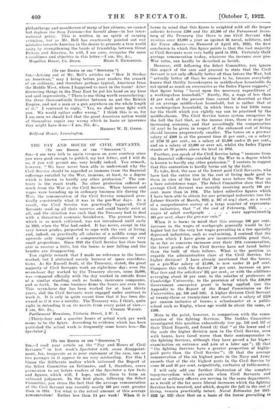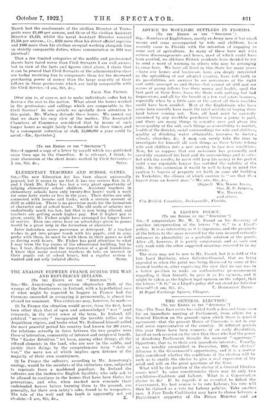[To THE EDITOR OF THE " SPECTATOR.") Sin,—I read your
article on the "Pay and Hours of Civil Servants" in last week's Spectator with some disappoint- ment, for, temperate as is your statement of the case, one or two passages in it appear to me very misleading. For this I blame the deliberate malice which informed the Report of the Select Committee on Estimates, and I, therefore, crave Permission to set before readers of the Spectator a few facts and figures, which will, I hope, enable them to form an unbiased judgment. In the first place, following the Select Committee, you stress the fact that the average remuneration of the Civil Servant was recently nearly 100 per cent. greater than in 1914. Yet what is the actual amount of this average remuneration? Rather less than £4 per week ! When it is borne in mind that this figure is weighted with all the larger salaries between £200 and the £3,500 of the Permanent Secre- tary of the Treasury (for there is one Civil Servant who rezeives over £3,000 a year as against 56 naval, military, and Air Force officers—see Hansard of April 4th, 1922), the first
conclusion to which this figure points is that the vast majority of Civil Servants were very badly paid in 1914. Certainly their average remuneration to-day, whatever the increase over pre- War rates, can hardly be described as lavish.
However, still following the Select Committee, you ignore this aspect of time ease and proceed to state that the Civil
Servant is not only officially better off than before the War, but "actually better off than he seemed to be, because everybody knows that thrifty housekeepers in middle-class households do not spend as much on necessaries as the Index Figure suggests," that figure being "based upon the necessary expenditure of a working-class household." Surely, Sir, a wage of less than £4 per week at the present time cannot be described as that of an average middle-class household, but is rather that of a working-class household, in which there is but little room
for the thrift which you rightly say can be practised by the middle-classes. The Civil Service bonus system recognises to the full the fact that, as the income rises, there is scope for increasing economy, and that accordingly the compensation (if any) to be given in respect of the enhanced cost of living should become progressively smaller. The bonus on a pre-war salary of £500 is at the present time 41 per cent., on a salary of £750 32 per cent., on a salary of £1,000 under 25 per cent., and on a salary of £2,000 or over nil, whilst the Index Figure stands at 79 points above its level in 1914.
Further, you speak of the Civil Service being "immune from the financial sufferings entailed by the War to a degree which is known to hardly any other profession." I venture to suggest that this contention is hardly borne out by the facts.
To take, first, the case of the lowest paid Civil Servants, who have had the entire rise in the cost of living made good to them in view of the fact that they were before the War on a bare subsistence wage. The Select Committee show that the average Civil Servant was recently receiving nearly 100 per cent, more than in 1914. The latest collective figures which I have been able to obtain for our principal industries (see the Labour Gazette of March, 1922, p. 107 et seq.) show, as a result of a comprehensive survey of a large number of representa- tive industries, that " at the end of February, 1922, . . . wages of adult workpeople . • . . were approximately 100 per cent, above the pre-war rate."
When it is horns in mind that this average 100 per cent. increase in the wages of workpeople generally would be far higher but for the very low wages prevailing in a few specially depressed industries, such as coal-mining, I contend that the figures which I have given are incontrovertible proof that, in so far as concerns increases over their 1914 remuneration, the lower grades of the Civil Service have not fared better than the bulk of their fellows. What is the position as regards the administrative class of the Civil Service, the higher division? I have already mentioned that the bonus, on a pre-War salary of £1,000, is now under 25 pef cent. Compare this with the doctors' 50 per cent, increase on pre- War fees and the solicitors' 33-1 per cent., or with the additions averaging about 50 per cent, to the salaries of professors at Cambridge University, to the provision of which the £30,000 Government emergency grant is being applied (see the Appendix to the Report of the Royal Commission on the Universities, pp. 148 and 348). A higher division Civil Servant of twenty-three or twenty-four now starts at a salary of £320 per annum inclusive of bonus; a schoolmaster at a public school such as Rugby, whose age would be about the same, at £400.
More to the point, however, is comparison with the remu- neration of the fighting Services. The Geddes Committee investigated this question exhaustively (see pp. 156 and 157 of their Third Report), and found (1) that "at the lower end of the scale the higher division men in the Civil Service, even with bonus, have fared worse than their contemporaries in the fighting Services, although they have passed a far higner examination on entrance and join at a later age "; (9) that "the fighting Services have a greater proportion of highly- paid posts than the Civil Service"; (3) that the average remuneration of the six highest posts in the Navy and Army exceeds that of the six highest posts in the Civil Service by some 38 and 46 per cent, respectively, exclusive of table-money. I will only add one further illustration of the complete topsy-turvydom which prevails when Civil Servants and naval or military officers are serving in the same department, as a result of the far more liberal increases which the fighting Services have received, and which, despite the fall in the cost of living, remain practically intact. Naval Estimates for 1921- 1922 (p. 132) show that on a basis of the bonus prevailing in
March last the emoluments of the civilian Director of Trans- ports were £1,409 per annum; and those of the civilian Assistant Director 21,125, whilst the naval Assistant Director received £1,534 per annum., i.e., £125 snore than his direct official superior and £409 more than his civilian co-equal working alongside hint on strictly comparable duties, whose reniuneration in 1914 was identical!
That a few limited categories of the middle and professional classes have fared worse than Civil Servants I am well aware; but in view of the facts and figures cited above, I claim that it can be proved that Civil Servants of the administrative class are to-day receiving less to compensate them for the decreased purchasing power of money than the large majority of their fellows in those professions which are fairly comparable with the Civil Service.—I am, Sir, he.,
FACTS NOT FICTION.
[Our aim is, of course, not to make individuals suffer but to decrease the cost to the nation. What about the hours worked in the professions and callings which are comparable to the Civil Service? In our article we specially drew attention to this point. Mr. Watney defends those hours. We cannot say that we share his easy view of the matter. The Associated Chambers of Commerce considered that by means of such longer hours as might fairly be demanded in these limes, and by a consequent reduction of staff, 25,000,000 a year could be saved.—ED., Spectator.]







































 Previous page
Previous page